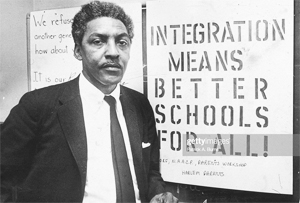
A decade before Rosa Parks’ arrest for refusing to give up her seat on a Montgomery, Alabama bus, police dragged Bayard Rustin off a bus in Tennessee for the same act of protest. When pressed about why he was resisting segregation, Rustin gestured to a young white boy seated at the front of the bus. “If I sit in the back,” Rustin said, “I am depriving that child of the knowledge that there is injustice here, which I believe is his right to know.”
Bayard Rustin, an often unsung hero of the civil rights movement, spent his entire life exposing injustice in our nation. Even before he served as lead organizer of the 1963 March on Washington where Dr. Martin Luther King, Jr. declared his dream, Rustin was labeled a Communist and a radical by the government. When he traveled to the segregated South during the first-ever Freedom Rides, he experienced a barrage of racial slurs and violence.
But in America, in the 1950s and 60s, no label stuck to Bayard Rustin quite like “homosexual.” As an openly gay man, Rustin was attacked by everyone — Congressmen and activists, black and white — simply for living openly. Yet, at a time when few others would, Rustin proudly wore that label.
To Bayard Rustin, fighting for his equality as a black man, while leaving his identity as a gay man unspoken, would have been an unthinkable betrayal. It was his firm belief that silence about either identity meant he accepted the system of discrimination that allowed hatred about both to persist.
Long before it was easy or safe, Rustin was motivated to live openly. He could have hidden the fact that he was gay. When confronted about it, he could have lied — that’s what everyone did in those days. But Bayard Rustin was exceptional. He lived openly because to do otherwise would be a missed opportunity in exposing the injustice and intolerance he, along with other members of the LGBT community, experienced.
Despite a lifetime lived in service to justice and nonviolence, Rustin’s legacy was marginalized by his sexuality. His 1987 New York Times obituary demonstrated the evasive language about LGBT people that was all too common in the media just a few short years ago. The obituary skirted the topic of his being gay and referred to his longtime partner by euphemism only. Even today, his name is not nearly as well known as the other greats of the Civil Rights movement.
This Black History Month, we should not forget trailblazers like Rustin. Out of dedication to his life and legacy, let us uplift the stories of LGBT African-Americans who felt and still feel the burdens of discrimination — those whose very lives illustrate the insistent fact that the fight to treat all people equally is both this country’s greatest accomplishment and its greatest unfinished obligation.
Today, the National Association for the Advancement of Colored People, the nation’s oldest civil rights organization, and the Human Rights Campaign, the nation’s largest LGBT civil rights organization, are proud to work together toward equality. And we’re proud that President Barack Obama used his second inaugural address to link the Civil Rights movement and the LGBT Equality movement just last month. But long before a president like Barack Obama was even possible, Bayard Rustin was preaching an equal future. We shouldn’t forget his sacrifice, and the greatest tribute to his legacy would be to finish his work.
Benjamin Todd Jealous, NAACP President & CEO
Chad Griffin, HRC President
